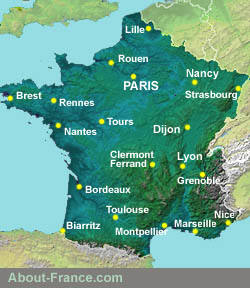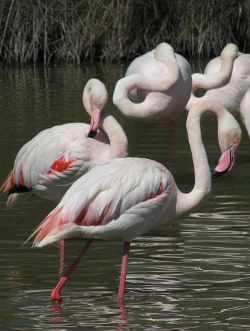- Explore France ►
- KEY PAGES
- Where to go
- How to get there
- Learn about France
Verb tenses: imperfect, pluperfect
The imperfect and pluperfect tenses in French
Past tenses in French, 2| Page index: | The imperfect | The pluperfect |
In addition to the two main past
tenses, the preterite
and the composite
past, French has two more tenses to
express
actions in past time, the
imperfect
and the
pluperfect.
Generally speaking, these correspond to the past progressive and past perfect in English, but their uses are not quite the same.
Generally speaking, these correspond to the past progressive and past perfect in English, but their uses are not quite the same.
1. The imperfect
The imperfect tense in French is used to express ongoing or lasting action in the past. In this it corresponds to the past progressive in English (i.e. I was reading); it also corresponds to the English tense structure with used to.However the French imperfect tense is used much more frequently than the English past progressive, as it is also used to express continuing or repeated actions in the past that, in English, would be expressed by means of the preterite. See examples 2 and 3 below.
This is notably the case for verbs that intrinsically imply duration, such as savoir, connaître, vivre, etc., for which the imperfect is a very common, if not the most common, past tense in French.
One common use of the imperfect is in sentences that relate two past events to each other, one expressing an ongoing situation, the other a specific action. See examples 7 and 8 below.
In cases where two related past events both imply duration, in French both verbs will normally be in the imperfect. In English, by contrast, only one of them - and sometimes neither of them - may be expressed using a verb in the past progressive - notably when the verbs intrinsically imply duration. See examples 9 and 10 below.
Just occasionally, the imperfect is used as an alternative to the preterite, as a past narrative tense; in this usage it is sometimes referred to as the picturesque past, le passé pittoresque, and was used as a technique of style by writers such as Georges Simenon and Mario Ropp.
For all verbs, the imperfect tense is formed with the endings:
-ais, -ais, -ait, -ions - iez -aient.
Sample verb: porter
Singular: Je portais, tu portais, il/elle/on portait
Plural: Nous portions, vous portiez, ils/elles portaient
Examples:
1. Je blaguais.
I was joking
2. A l'époque, la maison m'appartenait.
At the time, the house belonged to me.
3. Il achetait souvent des livres rares.
He often bought rare books .
4. Au moment de l'accident la voiture roulait très vite.
At the time of the accident the car was going very fast.
5. L'homme travaillait souvent dans son jardin très tard le soir.
The man often used to work in his garden very late in the evening.
6. J'allais vous dire que je reconnaissais cet homme.
I was going to tell you that I recognised that man.
7. Je suis tombé de mon vélo alors que je sortais du garage.
I fell off my bike as I was coming out of the garage.
8. Je somnolais quand j'ai entendu le réveil
I was snoozing when I heard the alarm.
9. Quand nous vivions à Paris nous n'avions pas de voiture.
When we were living in Paris we didn't have a car.
10. Je ne savais pas qu'il parlait russe.
I didn't know that he spoke Russian.
1. Je blaguais.
I was joking
2. A l'époque, la maison m'appartenait.
At the time, the house belonged to me.
3. Il achetait souvent des livres rares.
He often bought rare books .
4. Au moment de l'accident la voiture roulait très vite.
At the time of the accident the car was going very fast.
5. L'homme travaillait souvent dans son jardin très tard le soir.
The man often used to work in his garden very late in the evening.
6. J'allais vous dire que je reconnaissais cet homme.
I was going to tell you that I recognised that man.
7. Je suis tombé de mon vélo alors que je sortais du garage.
I fell off my bike as I was coming out of the garage.
8. Je somnolais quand j'ai entendu le réveil
I was snoozing when I heard the alarm.
9. Quand nous vivions à Paris nous n'avions pas de voiture.
When we were living in Paris we didn't have a car.
10. Je ne savais pas qu'il parlait russe.
I didn't know that he spoke Russian.
2. The pluperfect
The pluperfect tense in French is used to express action in a distant past.One common use of the pluperfect is in sentences that relate two historic past events to each other, where one of the events took place further in the past than the other. In this situation, the French pluperfect corresponds to the past perfect in English.
However French can also use the pluperfect in some cases where English would use the preterite or present perfect: in these instances, the function of the pluperfect is simply to imply an action that is very much in the past, and long since terminated. See examples 5 and 6 below.
The pluperfect is also used in past reported speech, to report a statement originally expressed using the composite past. See examples 7 and 8 below.
For all verbs, the pluperfect tense is formed with the imperfect of avoir (or in specific cases of être), followed by the past participle:
Sample verb: porter
Singular: J'avais porté, tu avais porté, il avait porté
Plural: Nous avions porté, vous aviez porté, ils avaient porté
Sample verb: aller
Singular: J'étais allé, tu étais allé, etc.,
Examples:
1. J'avais parlé à mon avocat avant de venir
I'd spoken to my lawyer before coming
2. A peine avait-il fini de ranger ses outils, qu'il se mit à pleuvoir.
He'd hardly finished putting away his tools, than it started to rain.
3. Nous avions bien regardé la maison avant de l'acheter.
We'd had a good look at the house before buying it .
4. J'avais pensé que tu pourrais venir cet après-midi.
I'd thought you might come this afternoon.
5. La construction du pont avait été commencé par les Romains.
The building of the bridge was started under the Romans.
6. Je vous connais, parce que ma mère avait souvent parlé de vous.
I know you, because my mother often talked about you.
7. Il disait qu'il avait déjà assez bu.
He said he'd already drunk enough.
8. Je savais que tu me l'avais déjà dit.
I knew you'd already told me.
1. J'avais parlé à mon avocat avant de venir
I'd spoken to my lawyer before coming
2. A peine avait-il fini de ranger ses outils, qu'il se mit à pleuvoir.
He'd hardly finished putting away his tools, than it started to rain.
3. Nous avions bien regardé la maison avant de l'acheter.
We'd had a good look at the house before buying it .
4. J'avais pensé que tu pourrais venir cet après-midi.
I'd thought you might come this afternoon.
5. La construction du pont avait été commencé par les Romains.
The building of the bridge was started under the Romans.
6. Je vous connais, parce que ma mère avait souvent parlé de vous.
I know you, because my mother often talked about you.
7. Il disait qu'il avait déjà assez bu.
He said he'd already drunk enough.
8. Je savais que tu me l'avais déjà dit.
I knew you'd already told me.






